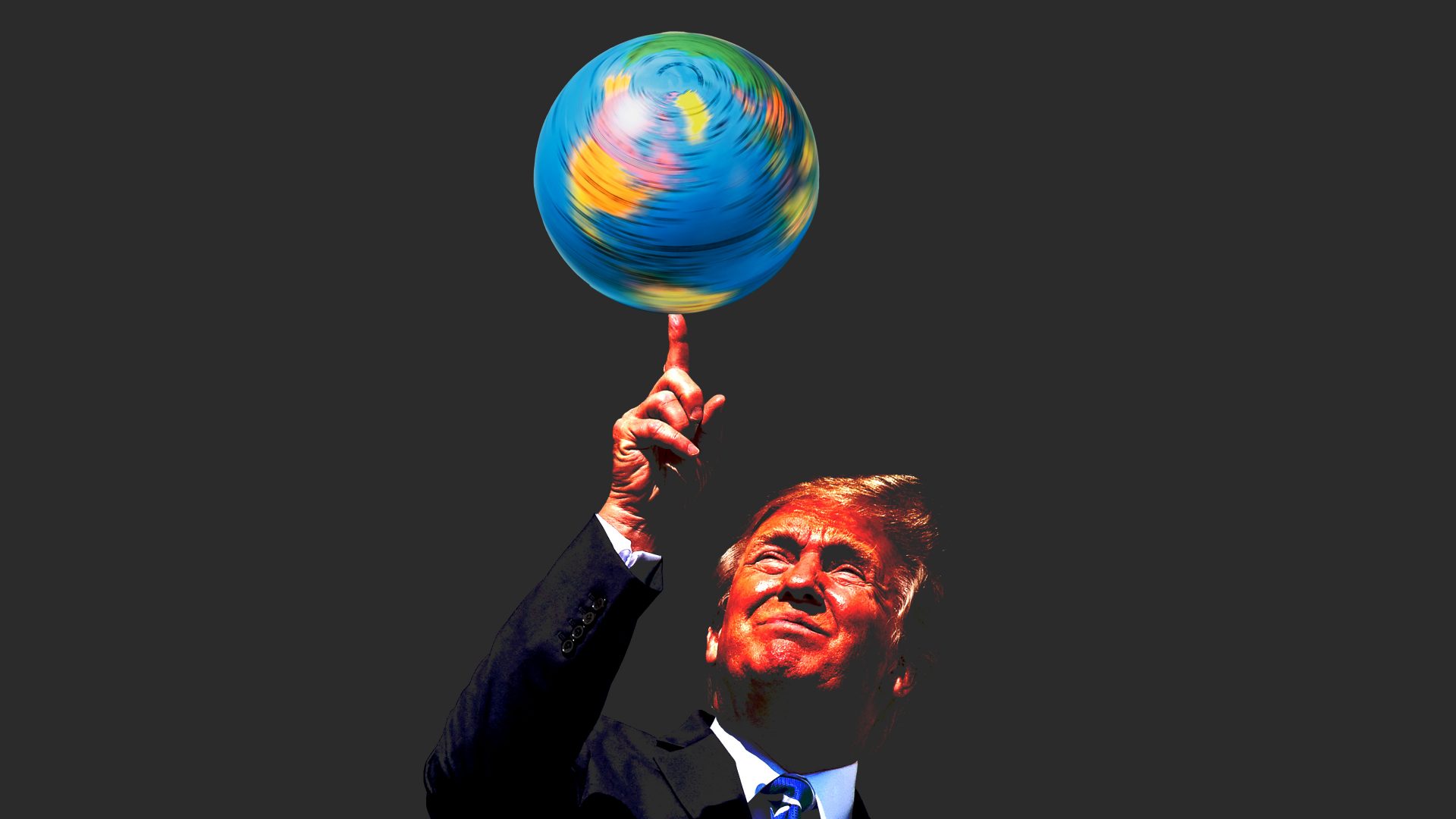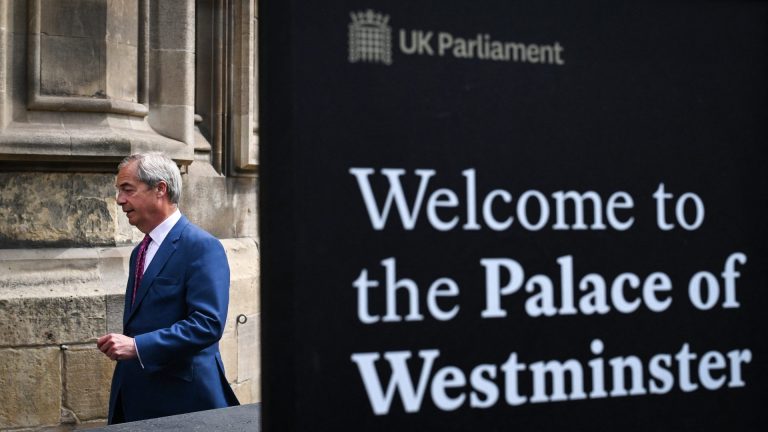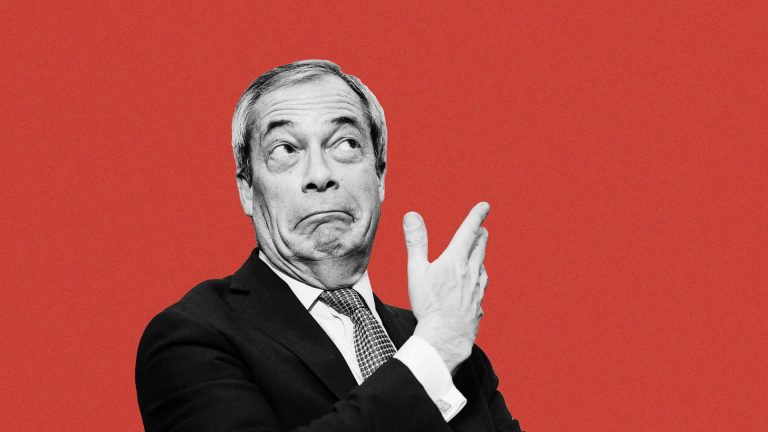The far right is taking the world by storm. From the Republican Party in the US to the Conservative Party in Britain, it has already influenced some of the most powerful governments in the western world. Across Europe, Italy, the Netherlands, Finland, Poland, Hungary, Croatia, the Czech Republic and Sweden have seen far right parties in government.
The second largest political party in Germany, and the third largest in France, are far right. Under Elon Musk’s ownership, the X social media platform (formerly known as Twitter) – widely seen as a kind of global public square – has become a hotbed of white supremacism, misogyny and conspiracy theories.
Even amid electoral setbacks and failures, the data is clear: extreme nationalist populist movements have developed a shockingly persistent stranglehold over western politics and culture, one that is inexorably growing in popularity – with bizarre and dangerous consequences.
For the first time in history, for instance, a US presidential candidate openly promised, just weeks after being targeted for political assassination, to end American democracy: once he is elected, Donald Trump said, Americans “don’t have to vote again. We’ll have it fixed so good you’re not going to have to vote”.
Not long after, Britain was wracked by its worst far right riots in decades, as angry, disenfranchised louts laid waste to towns and cities to target the evil trifecta of Muslims, migrants and mosques – all whipped up by disinformation about the tragic murder of children at a Taylor Swift dance workshop.
English Defence League founder “Tommy Robinson” (real name: Stephen Yaxley-Lennon) spread fake news by blaming an Islamist migrant arriving illegally in Britain for the murders – it turned out the suspect was in fact a 17-year-old British-born boy with autism whose parents were devout Christians of Rwandan origin. Elon Musk amplified Robinson’s fake news on his X platform and claimed that a coming “civil war” in Britain was “inevitable” – a tweet that was in turn amplified by Russian state media.
In 2010, I predicted where much of the west would find itself over the ensuing decade. I warned that “the entire mainstream party-political system” would end up being “completely discredited” due to being unable to deal with the structural causes of escalating economic crises, “while mainstream policy solutions serve largely to contribute to them, not ameliorate them… The collapse of the mainstream party-political system across the liberal democratic heartlands could pave the way for the increasing legitimisation of far right politics by the end of this decade in the context of massive structurally generated resource scarcities.”
This devastating reality has indeed unfolded as I expected, leaving us at an alarming inflection point. For the first time since the second world war, there is a real prospect that the democratic experiment may come to either an abrupt and violent end or a protracted, if still precipitous, decline. This is the largest and most consequential crisis of democracy the western world has ever faced.
The rise of the far right as a global movement is therefore no mere peripheral concern. It’s a planetary crisis which threatens to undermine the very foundations of free societies across the world, from the US to the UK, Europe and beyond. How did we get to this point of such deep fragility in our democracies? Why is this happening? And how do we fight back?
The postwar liberal international order is very far from perfect. I count myself as one of its loudest critics. But the greatest virtue of genuine democracy, of a society that values freedom, is that it welcomes its critics. In a free society, the critic is not an enemy but a most precious friend. Only through the exercise of reason and the tests of scientific rigour, tempered through dialogue and debate – and often empowered through social struggle – have western societies been able to allow better ideas and more constructive approaches to win through. Being able to take criticism, and evolve in response to it, is the most elementary requirement of a free and democratic society. Without this, there can be no hope of the societal improvements that are the bedrock of human progress.
Western civilisation, for all its flaws and problems, has thrived most through celebrating and harnessing diversity and dissent in thinking across society, culture and politics. This cauldron of differences, contested through the corridors of civil society via the pen, the keyboard, the speech, the broadcast, the podcast and so on, is what enables people from all sorts of backgrounds, ancestral origins and walks of life to learn together, find solutions, discover new possibilities and push humanity forward.
Yet all this is under threat. Not, however, from the outside – but from within. In many ways, the flaws in our parliamentary institutions, the inadequacy of checks and balances, the growing power of an unaccountable elite and the increasing intrusion of elite interests into the organs of media domination are not merely blemishes on what once made the west great but widening cracks which have always been there. They are now being exploited by a global political movement with a treacherous vision of what the west should be.
To make the west “great again”, this once-emerging-but-now-consolidating movement harks back to forms of authoritarian politics which the west was supposed to have both defeated and transcended, first with the crushing of the Nazi regime in Germany during the second world war and later with the rollback of Soviet Communism.
In fact, these authoritarian forces were never truly defeated. Instead, they regrouped and adapted. Over the last half century, an increasingly fraught systemic crisis at the heart of the global economy – one which most policymakers and major institutions do not understand – has supercharged this process.
The global system’s dependence on fossil fuels helped create extraordinary levels of wealth after the devastation of the second world war, but it was not long before the global energy system began to shift into a new state, where the amount of energy produced relative to the amount of energy used to produce it began to inexorably decline.
This decline of “energy return on energy invested” (EROEI, sometimes shortened to EROI) has escalated, even as new discoveries of oil and gas took place, while the rate of those discoveries has also dramatically declined. Even as we are producing increasing quantities of fossil fuels, the costs of doing so have increased and the energy returns are diminishing.
This has two major consequences. Firstly, the decline of the EROI of the global fossil-fuel system has resulted in an increasingly volatile and crisis-prone global economy, in which long-term inflation has accompanied a slowdown of economic growth. As EROI declines, and more energy is needed to sustain the energy system itself, then the surplus energy available to invest in other services outside of energy – the things that make our economy sing (like transport, health, education, infrastructure, arts and culture, and beyond) – diminishes. The result is a cycle of rising debt, rocketing inflation and ruthless austerity.
Secondly, as the system consumes increasing quantities of fossil-fuel energy to keep itself going, emissions of carbon dioxide increase. For the last several hundred thousand years, the Earth has exhibited a fortuitous dynamic equilibrium in the global carbon cycle which has kept quantities of carbon dioxide in the atmosphere stable, so that the amount emitted by living species and the amount absorbed is in a profound balance. That balance is what has allowed life to flourish. But our intensifying carbon emissions, which have gone up exponentially in the last few hundred years – even more so in the last few decades – is disrupting this natural balance and ultimately trapping more energy within the global climate system. This has led to the intensifying danger of global heating, which our best scientific research suggests could trigger the breakdown of key planetary life support systems within decades. At worst, that could culminate in an uninhabitable planet as early as the end of this century. Along the way, it’s destabilising food systems, making our infrastructure obsolete, driving costly and dangerous extreme weather and increasing the frequency and severity of deadly violent conflicts.
The intensification of this global crisis has seen rising disillusionment with existing political and economic institutions – as well as dominant norms and values. That’s not because people understand this crisis, but because they are increasingly agitated about its symptoms of persistent economic malaise, an intractable cost of living crisis and the chaotic movement of people across borders.
Far right groups have latched on to this increasing agitation and zeroed in on these symptoms, distracting from understanding of their systemic origins and instead blaming as many elements of the existing postwar architecture as they can: from migration to multiculturalism to “globalism”.
As greater numbers of people recognise that the postwar architecture seems genuinely impotent to solve our problems, the far right has sought to exploit that sentiment with a view to rolling back time to an age of imagined greatness, drawing inspiration from the history of failed experiments with authoritarianism, fascism and colonialism. The problem is that such a rollback, focused on demonising and attacking symptoms, doesn’t deal with, or even see, the underlying systemic issues – and is therefore bound to fail.
By 2015, there was a shift in the global system which saw the far right not only forge a surprising level of coherence, despite huge ideological differences, but also secure unprecedented political and cultural victories across the US, UK and Europe.
Since then, mobilising under the banner of nationalist populism, the far right has gone truly global – connecting up Trumpism to the UK Conservative Party, Reform UK and increasingly influential far right parties across Europe, such as the Alternative for Germany (AfD), the Freedom Party of the Netherlands and the Sweden Democrats, to name just a few. I call this rapidly solidifying global network the “Alt Reich”. Political defeats have not halted the Alt Reich’s continued growth. The 2020 victory of Joe Biden emboldened Donald Trump, paved the way for a violent insurrection on Capitol Hill and precipitated the far right takeover of the Republican Party.
Although the Labour Party won by a landslide in the 2024 UK general election, following the collapse in support for the Conservatives, Reform UK, run by Nigel Farage, became the third most popular political party in Britain, grabbing 14% of the vote share. Farage would, within a month of becoming an MP, express sympathies for the sentiments inspiring the violent far right mob riots that erupted after the Southport murders, seemingly justifying them as “a reaction to fear, to discomfort, to the unease that is out there shared by tens of millions of people”.
The different nodes in the Alt Reich have their own localised views, beliefs and political strategies. But their historical origins can be traced back to a milieu of fascist ideas cemented around Nazism in the 1930s. Since then, they have become transmuted through a wide range of social and cultural trajectories, ending up as often wildly varying permutations, many of which vehemently disavow Nazism and fascism despite borrowing, sharing or sympathising with their key tenets.
Through this process, they have converged on a unifying set of concepts rooted in two grand theories: the “Great Replacement” and “Cultural Marxism”.
The first is the belief that white people in the west are being replaced and dominated through mass foreign immigration and rising birth rates of ethnic minority communities, a process which will culminate in a takeover by foreign cultures and political institutions defined by affinity to a totalitarian Islamist political ideology. The second is the belief that there is an ongoing academic, intellectual and cultural assault on the western “way of life” driven by “the left” over the last 70 years, aiming to replace traditional Christian and conservative values with liberal multiculturalism.
Despite their paradoxical relationship (including the obvious contradiction in the idea that gender-fluid liberals are in cahoots with gay-hating Islamist totalitarians), both these ideologies are rooted in antisemitic conspiracy theories which are the direct descendants of Nazism. As they’ve evolved, they have become interwoven and mutually self-reinforcing.
They now increasingly animate even mainstream political leaders, and as they intertwine with technology they are spawning new and bizarre authoritarian visions, which refract the fascist ideologies of the 1930s in a new “postmodern” context.
Although loose and uncoordinated, the proliferating ties between these different political groups and networks across the US, the UK and Europe are being supercharged through social media and the “dark web”, via figures like Jordan Peterson and Andrew Tate, and legitimised through respected academic institutions and opaque think tanks.
In the context of an unprecedented convergence of global economic, energy and ecological crises, this movement has driven a global radicalisation process in which the centres of western political power are being rapidly co-opted by fringe, extremist ideologies. The purveyors of these ideologies want to destroy the checks and balances, separation of powers and fundamental civil rights that make democracy possible.
Extreme nationalism, racism and xenophobia, in this context, are ideological tools to divide and weaken the public, making way for new forms of deregulated capital, controlled by nationally organised groups of competing elites.
Ultimately, a far right takeover cannot deliver. The failure of the 2017-21 Trump administration and the collapse of the Conservative Party in the UK are among the clearest signs that this is not an ideology that can actually solve any of humanity’s biggest challenges, but, on the contrary, will only worsen them – along the way accelerating chaos, disillusionment, political apathy and violence, often aimed at the most vulnerable.
Meanwhile, the unattractiveness of the main centrist liberal parties – the Democrats in the US and Labour in the UK, for instance – and especially their continued abject subservience to what many citizens feel is a flawed system, deepens this vacuum and leaves voters feeling hopeless. This in turn boosts the scope for fringe and extremist groups to step into the void.
The fate of democracy itself hangs in the balance, and with it the fate of the human species and the planet, as elections across the west could drive tipping points that push the political hemisphere off the edge. In recent years, analysts have fretted over the devastating security implications if a far right US government moves to fracture the Nato alliance, opening the door for Putin’s Russia to ramp up military aggression far beyond Ukraine in pursuit of longstanding ambitions to create a new Eurasian Russian empire.
And yet, the vanguard of such a prospective assault on the west is already here, embedded among far right political agitators, eagerly awaiting the opportunity to remake democracies in their own image – and in that of their strongman hero, Putin.
What might emerge out of this chaos does not bear imagining. At worst, it could look like a network of far right regimes from the United States across Europe to Russia, with selected authoritarian allies in Asia. This would represent a new global neo-fascist political order, whose explicit goal is the destruction of democracy as we know it, along with the violent subjugation of minorities as well as the working and middle classes, under the power of authoritarian elites merging corporate and state power.
What might have seemed like a dim but unlikely nightmare after the second world war now seems like an all too real possibility.
That new way forward cannot involve more of the same. It will not be enough to gather a new programme for progressives, though that is of course essential. It will also be critical to formulate a new programme for the right, one which retrieves its core principles from the extremists who have hijacked them.
This new transformative programme, which might at once transcend conventional left–right divides and inspire new ways of organising ourselves politically and economically, will only be meaningful if it addresses the fundamental systemic drivers of the converging global crises we face as a species: the decline of fossil fuels, our economic dependence on dying industries and the resulting destruction of planetary life-support systems, among others.
We will need to look forward and consider how to work together to reshape our civilisation in a planetary context. If we do not, the rise of the Alt Reich will be the precursor to our collapse.
An edited extract from Alt Reich, by Nafeez Ahmed, published by Byline Books









